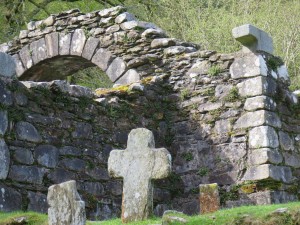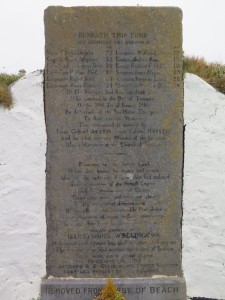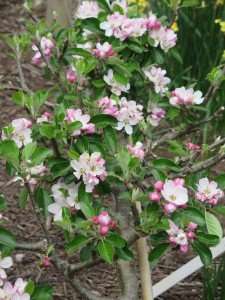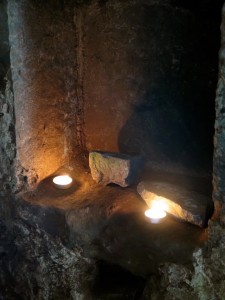 On 30 January 1816, the military transport ship HMS Seahorse went aground off Brownstown Head in Tramore and sank. Of the 402 people on board, 376 drowned. The ship was carrying men returning from the Napoleonic Wars. It was also carrying wives and children who had ‘followed the drum’ during the military campaigns that eventually defeated Napoleon. The names of the officers who died are engraved on a stone tablet overlooking the beach. The names of the soldiers and sailors are written in the records of the Admiralty and the War Office. The names of the women and children are gone.
On 30 January 1816, the military transport ship HMS Seahorse went aground off Brownstown Head in Tramore and sank. Of the 402 people on board, 376 drowned. The ship was carrying men returning from the Napoleonic Wars. It was also carrying wives and children who had ‘followed the drum’ during the military campaigns that eventually defeated Napoleon. The names of the officers who died are engraved on a stone tablet overlooking the beach. The names of the soldiers and sailors are written in the records of the Admiralty and the War Office. The names of the women and children are gone.
Over the course of human history, more than a few names have been lost. If you were male and wielded a lot of power, you are more likely to be recorded somewhere…but it is by no means a sure thing even then.
 When I first discovered the memorial for the officers and started scrolling through articles about that long ago event, I managed to work myself into a pretty high dudgeon. [I decided not to share this with my husband who was already listening to my pathetic whimpers about the rain.] But after a while I began to wonder whether this (rather intense) reaction had anything to teach me – beyond the fact that I have as many knee-jerk reactions as anyone else.
When I first discovered the memorial for the officers and started scrolling through articles about that long ago event, I managed to work myself into a pretty high dudgeon. [I decided not to share this with my husband who was already listening to my pathetic whimpers about the rain.] But after a while I began to wonder whether this (rather intense) reaction had anything to teach me – beyond the fact that I have as many knee-jerk reactions as anyone else.
By coincidence (or not, depending on your point of view), I have been in a period of deep discernment about the journey that stretches before me. So, metaphor and symbol have been tapping me (okay, clouting me – ) on the shoulder constantly. I began to wonder about names: not the names I have forgotten, but about the names I never bothered to bestow.
Names are profoundly important – something we know from their power in every culture out there. In some of the Native American cultures, names change at adulthood or following a significant event. In Jewish and Christian scripture, the earthling (which is what adham – Adam – actually means, “earth-ling”) names all the animals and birds (and, presumably, by extension, the fish and insects) which mythically establishes an irrevocably interwoven relationship between humans and all other species for all time. In some Asian cultures, one’s real name is never used in order to protect the soul from being taken over by an evil spirit. Names are important.
So the real question that will not let me ignore it is, What have I refused to name? And why?
I would never fail to name something I love, or something I admire, or something I want to remember. I would not voluntarily forget the name of a place where something amazing or special happened. I don’t resist giving names to favorite events, or fond memories (“The Chinese Dinner Song.”) No, there is a consistency to the things I don’t name, that I choose not to name: they are moments of life I don’t want to own. They are personality traits I want to ignore. They are events about which I feel shame. They are locations where pain was inflicted (hurtful words were said — sometimes by me; a relationship ended; a hope was not just lost, but smashed).
This week, at a moment of really low ebb, I received an epiphany. I was weeping, and I put my head down on my arms and said, “I just want it to stop!” My husband reached over and gathered me in against his shoulder and asked, “What is the ‘it’ you want to stop?” And I sat there leaving tear stains on his shirt and realized I didn’t know. I wanted some horrible, unidentified pain to stop, but I had never bothered to name it, so I couldn’t observe it, I could only be it.
 As Beltane unfolds, crops are beginning to become recognizable (this is carrots, that is parsley). Some are seeds we planted and some are seeds that the universe blew into our spirit, or a bird dropped. Maybe they came through our inner landscape caught in the fur of a fox or the wool of a grazing sheep. However they arrived, they are growing. And I am thinking that it may be important to name them – even the ones that don’t look like something I happen to want in my internal garden.
As Beltane unfolds, crops are beginning to become recognizable (this is carrots, that is parsley). Some are seeds we planted and some are seeds that the universe blew into our spirit, or a bird dropped. Maybe they came through our inner landscape caught in the fur of a fox or the wool of a grazing sheep. However they arrived, they are growing. And I am thinking that it may be important to name them – even the ones that don’t look like something I happen to want in my internal garden.
It is hard to have clarity about undifferentiated stuff. It is like groping through unlighted rooms with no known parameters and indiscernible contents. Maybe this hard object I just ran into evokes nothing but anger (or pain, or confusion). I have a choice. It can remain part of the undifferentiated stuff, or I can choose to at least try to figure out what it might be. I can name it. Is it a danger (“Yikes, low wall around what feels like a huge hole.”) or might it actually be useful (a lesson, a blessing, grace in a difficult situation — “Oh, wow. A wrought iron candle stand – with candles!”)
I don’t think I am going to become particularly skilled at this any time in the near future. I suspect I am going to fall way too easily into the old, protective habit of shoving the scary stuff or the ugly stuff or the confusing stuff into the back of some mental drawer or dark storage unit and hoping (vaguely – because I don’t want to think about it too deeply, after all) that it will just disappear if I leave it there long enough. It won’t. I know that in my head…I’m hoping my heart catches up soon.
Along with my recent determination to appreciate the rain as much as the sun (see last week’s blog), I am now determined to pull a few of the indistinct shapes out of my personal fog, and see if I can name them. Maybe I won’t be all that excited about what I find, but at least I’ll know what I am stubbing my toe on in the dark.
I will never know the names of those women and children who lost their lives in the sea off Tramore (or the hundreds lost in the Mediterranean every week trying to flee the wars in Africa), but I can honor them by acknowledging that names matter, and that I have the power to give names where no name exists.
In that spirit and with that respect, this is my hope for this week:
All-Knowing Name-Giver –
you name me into existence
and invite me to name you
however incompletely –
may you bless me with the nine gifts of naming:
the courage to risk life,
the curiosity to walk in shadows,
the generosity to cherish the forgotten,
the daring to explore the hidden,
the compassion to accept my own fear,
the strength to be imperfect,
the humility to be naked,
the willingness to be known,
the wisdom to speak truth.
–Andrea
Text © 2015, Andrea La Sonde Anastos
Photos © 2015 Immram Chara, LLC
